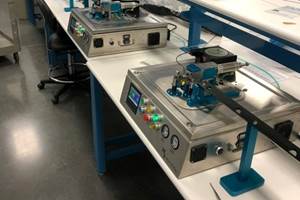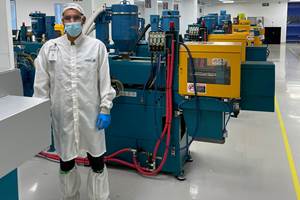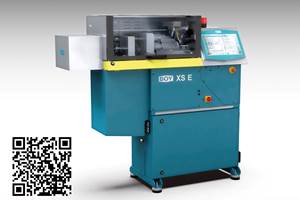China Is Ready for Value-Added Molding
A number of U.S. injection molders are establishing Chinese joint ventures and satellite molding plants to take advantage of the huge market opportunities there and to defend against the perceived threat of low-cost competition.
A number of U.S. injection molders are establishing Chinese joint ventures and satellite molding plants to take advantage of the huge market opportunities there and to defend against the perceived threat of low-cost competition. Some of these processors believe that relatively simple processes and technologies are the only ones suitable to be exported to China.
But that's not the philosophy of United Plastics Group (UPG) Inc., a custom injection molder of automotive, medical, electronics, and consumer parts. For UPG, manufacturing in China doesn't mean leaving technically sophisticated, value-added processes and services at home. "If you are not adding value to the customer in some way, it doesn't matter where the process is located," says William Featherstone, senior v.p. of sales and marketing at UPG headquarters in Oak Brook, Ill.
Featherstone defines "value-added" as not just high-tech automated pro-cesses, but also production of high-precision products at low cost and providing close customer service on a local level. UPG will embody this philosophy in a $10-million, 100,000-sq-ft, full-service custom manufacturing facility set to open next month in Suzhou, China.
The plant, UPG's largest, will be located in the Suzhou Industrial Park free-trade zone, about 50 miles from Shanghai. It is set up to promote international trade and exempts from taxes goods imported into the zone and exported from the zone. This will allow UPG to buy raw materials and sell finished goods at lower cost from within the zone than from its other plants, and they will be able to deliver the goods to the customer faster, saving time and shipping or inventory costs. Products manufactured at the plant will serve U.S.- and European-based multi-national companies, as well as its new and growing Asian customers.
The company produces auto interior and under-hood parts, Class 2 to Class 3 medical devices, and housings for cell phones, PDAs, and power tools. UPG also performs EMI shielding and painting for electronics and computers.
Sharing technologies
UPG already has 10 plants in four countries, operating 300 injection presses ranging from 7 to 1000 tons. It has six plants in the U.S., one each in Mexico and England, and two existing plants in the Suzhou free-trade zone. The last two are a tooling facility and a molding plant, both opened in Suzhou three years ago "as a way to dip a toe into China and learn how to do business there," says Featherstone. The "modest" 23,000-sq-ft molding plant has 20 presses and a class 100,000 clean room.
"The new Suzhou plant can accommodate 50 to 60 injection presses, and there will also be a separate area for assembly," says Featherstone. It will also mark the first time that several of UPG's most advanced processes can be performed under one roof, including two-shot molding, micro-molding, clean-room molding, precision gear molding, and assembly. Other high-end capabilities—such as microcellular foam molding, engineering and design services, tool repair and maintenance, and painting—may be set up there, too. "We will study where we need to bring our technology and how to translate it to work elsewhere. We are looking to export processes developed at one plant to other plants, where they can bring value to a customer," Featherstone explains. Experienced technicians from UPG's U.S. operations will go to China to train personnel there.
This approach toward plant capabilities represents a recent diversification effort by UPG. Four or five years ago, the company's production was more than 70% for the electronic industry while consumer, medical, and automotive products comprised the remaining 30%. UPG's output is more uniformly distributed today, with electronics assuming less than 50% of its current sales.
Related Content
Innovative Micro-Molding From Minnesota Machine Shop
Machine shops are natural inventors, but not necessarily suited to supporting and marketing a product. This Minnesota shop with an invention related to micromolding will share it through licensing.
Read MoreArterex Acquires Micromold
The medical device contract manufacturing company with eight facilities globally has purchased the Riverside, California-based micromolder.
Read MoreNew Machine Range Features Adjustable Clamp for Micromolding
The Boy XS E, successor to the XS series, features servodriven pump drives and different clamp configurations, as well as a special mold holder for optional micromolding operation.
Read MorePrecision Processing Requires Precision Equipment
Moretto offers plastics processors and micromolders for a broad suite of auxiliary solutions targeted specifically for precision processing.
Read MoreRead Next
See Recyclers Close the Loop on Trade Show Production Scrap at NPE2024
A collaboration between show organizer PLASTICS, recycler CPR and size reduction experts WEIMA and Conair recovered and recycled all production scrap at NPE2024.
Read MoreLead the Conversation, Change the Conversation
Coverage of single-use plastics can be both misleading and demoralizing. Here are 10 tips for changing the perception of the plastics industry at your company and in your community.
Read MoreFor PLASTICS' CEO Seaholm, NPE to Shine Light on Sustainability Successes
With advocacy, communication and sustainability as three main pillars, Seaholm leads a trade association to NPE that ‘is more active today than we have ever been.’
Read More





















